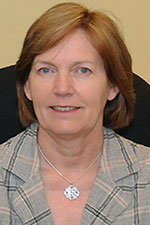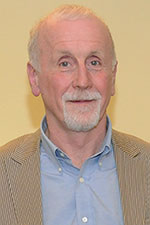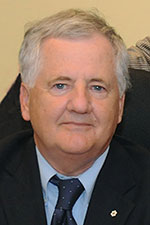
Bios of Economic Advisory Panel members
Find out more about the panel at the Social Media Release
Read the Terms of Reference for the Premier’s Panel of Economic Advisors (PDF)
Elizabeth Beale
 Ms. Beale is President and CEO of the Atlantic Provinces Economic Council. In this capacity, Ms. Beale is an advisor to senior levels of government on regional planning and economic strategies for Atlantic Canada. Ms. Beale’s policy and research interests cover a wide range of topics related to the economy of Atlantic Canada including labour market and innovation strategies. Ms. Beale also works closely with the business community and other stakeholders around Atlantic Canada to identify new opportunities for growth in the region’s economy.
Ms. Beale is President and CEO of the Atlantic Provinces Economic Council. In this capacity, Ms. Beale is an advisor to senior levels of government on regional planning and economic strategies for Atlantic Canada. Ms. Beale’s policy and research interests cover a wide range of topics related to the economy of Atlantic Canada including labour market and innovation strategies. Ms. Beale also works closely with the business community and other stakeholders around Atlantic Canada to identify new opportunities for growth in the region’s economy.
Ms. Beale resides in Halifax, Nova Scotia. She holds a B.A. from the University of Toronto and an M.A. in Economics from Dalhousie University. Ms. Beale has taken an active role in a number of professional and community organizations. Currently, she is a member of the National Statistics Council, Director of the Leslie Harris Centre of Regional Policy and Development at Memorial University and Director of Three Oaks Innovation at the University of Prince Edward Island.
Dr. Lars Osberg
 Lars Osberg is currently University Research Professor at Dalhousie University, Halifax, Canada and (for 2009-2010) Senior Visiting Research Fellow at Research on Poverty Alleviation (REPOA), Dar es Salaam, Tanzania. However, he began life in Ottawa, Ontario. As an undergraduate, he attended Queen’s University, Kingston and the London School of Economics and Political Science. After two years working for the Tanzania Sisal Corporation as a CUSO volunteer, he went to Yale University for his Ph.D.
Lars Osberg is currently University Research Professor at Dalhousie University, Halifax, Canada and (for 2009-2010) Senior Visiting Research Fellow at Research on Poverty Alleviation (REPOA), Dar es Salaam, Tanzania. However, he began life in Ottawa, Ontario. As an undergraduate, he attended Queen’s University, Kingston and the London School of Economics and Political Science. After two years working for the Tanzania Sisal Corporation as a CUSO volunteer, he went to Yale University for his Ph.D.
His first book was Economic Inequality in Canada (1981), and the most recent is The Economic Implications of Social Cohesion (edited - 2003). In between there have been eight others and three editions of an introductory economics textbook. He is also the author of numerous refereed articles in professional journals, book chapters, reviews, reports and miscellaneous publications. His major fields of research interest have been the extent and causes of poverty and economic inequality, with particular emphasis in recent years on social policy, social cohesion and the implications of working time, unemployment and structural change. Among other professional responsibilities, he was President of the Canadian Economics Association in 1999-2000.
Dr. Lars Osberg's recent papers
Dr. Tim O’Neill
 Dr. O’Neill is currently Visiting Professor in the Fuqua Business School at Duke University. He was appointed the first H. Ian MacDonald Visiting Economist in the Ontario Ministry of Finance in June, 2005 and served in that role until May 2007. He is also a partner in The Network Executive Team (TNET).
Dr. O’Neill is currently Visiting Professor in the Fuqua Business School at Duke University. He was appointed the first H. Ian MacDonald Visiting Economist in the Ontario Ministry of Finance in June, 2005 and served in that role until May 2007. He is also a partner in The Network Executive Team (TNET).
Dr. O’Neill served as Executive Vice President & Chief Economist of BMO from 1994 to 2005. He joined the Bank of Montreal in 1993 as Senior Vice President and Deputy Chief economist. Prior to joining the Bank , Dr. O’Neill held the position of President of the Atlantic Provinces Economic Council from 1988 – 1993. For 12 years before that, he taught in the Department of Economics at St.Mary’s University in Halifax. He has served as a consultant to several provincial governments, as well as the Canadian federal government.
Dr. O’Neill is a native of Sydney, Nova Scotia. He received his B.A. degree (with Honours) at St.Francis Xavier University, his M.A. at the University of British Columbia, and his Ph.D. at Duke University.
In his teaching, research and consulting activities, Dr. O’Neill has focused extensively on the structure and performance of the North American economy. Areas covered in his publications and public presentations have ranged from macroeconomic forecasts and assessment of key sectors of the economy, to examination of broader themes such as the economic impact of low literacy skills and the political economy of globalization.
Dr. O’Neill was, until recently, a Director of InStorage REIT and serves on the board of the United Church of Canada Foundation. He is one of two members of the Decision Review Board for the province of Ontario and is a member of the National Statistics Council.
Dr. O’Neill was the first Canadian economist to be elected to the Board of Governors of the Washington-based National Association for Business Economics (NABE) and served as Vice President in 2001-2002. In October 2002, Dr. O’Neill was elected President and completed his term in September 2003.
Dr. Donald Savoie
 Dr. Savoie holds a Canada Research Chair in Public Administration and Governance at the Université de Moncton. His research achievements are prodigious and his influence on Canadian public policy, Canadian public administration and Canadian society has been evident for years.
Dr. Savoie holds a Canada Research Chair in Public Administration and Governance at the Université de Moncton. His research achievements are prodigious and his influence on Canadian public policy, Canadian public administration and Canadian society has been evident for years.
Dr. Savoie has won numerous prizes and awards, including: the Trudeau Fellowships Prize (2004), the Vanier Gold Medal (1999) for "having made a significant contribution in the field of public administration in Canada," made an Officer of the Order of Canada (1993), and elected Fellow of the Royal Society of Canada (1992).
Dr. Savoie has published numerous books on public policy, public administration and federalism. His best known books include:
- Federal-Provincial Collaboration; Breaking the Bargain: Public Servants, Ministers, and Parliament;
- Governing from the Centre: The Concentration of Power in Canadian Politics;
- The Politics of Public Spending in Canada;
- Visiting Grandchildren: Economic Development in the Maritimes; and,
- Court Government and the Collapse of Accountability in Canada and the United Kingdom.
He has extensive work experience in both government and academia. He has held senior positions with the government of Canada and, in 1983, he founded the Canadian Institute for Research on Regional Development at the Université de Moncton.
He has served as an advisor to a number of federal, provincial and territorial government departments and agencies, the private sector, independent associations, OECD, the World Bank and the United Nations. At the request of the Canadian prime minister, he undertook in 1986-87 a review of federal government regional development efforts in Atlantic Canada and prepared a report that led to the establishment of the Atlantic Canada Opportunities Agency.